

CALLING ALL CODERS. By 2018, there will be more than two million open jobs in STEM (science, technology, engineering, math) professions, but only 19 percent of current college degrees are in STEM fields.

Even worse, 75 percent of students that do well in science and math decide to not pursue STEM in college. Standards. Education technology standards to transform learning and teaching The time for major change in education is now.
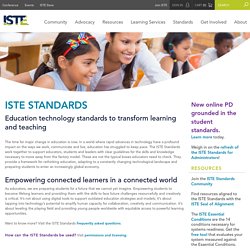
In a world where rapid advances in technology have a profound impact on the ways we work, communicate and live, education has struggled to keep pace. The ISTE Standards work together to support educators, students and leaders with clear guidelines for the skills and knowledge necessary to move away from the factory model. These are not the typical boxes educators need to check. Coding from kindergarten to graduation. We interact with computing devices every day—so should we have a better understanding of the science behind them?

An increasing number of districts are saying yes. This year, 25 states require computer science courses for high school graduation, compared to only 11 states in 2013, according to the Computer Science Teachers Association (CSTA). Districts are teaching basic coding to students as early as kindergarten, embedding computer science principles into core curriculum, and mandating computer science courses for graduation. The lessons teach students logical reasoning, algorithmic thinking and structured problem-solving—concepts and skills that are valuable in any discipline, proponents say. Should every school class be a computer coding class? This spring, at St.
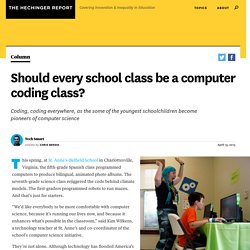
Anne’s-Belfield School in Charlottesville, Virginia, the fifth-grade Spanish class programmed computers to produce bilingual, animated photo albums. The seventh-grade science class rejiggered the code behind climate models. The first-graders programmed robots to run mazes. And that’s just for starters. “We’d like everybody to be more comfortable with computer science, because it’s running our lives now, and because it enhances what’s possible in the classroom,” said Kim Wilkens, a technology teacher at St. They’re not alone. One of the biggest challenges for computer science advocates is that many kids simply don’t see why coding matters, in a world of preloaded software and the vast resources of the Internet. Technology bootcamp reviews for aspiring programmers.
A Better Way to Choose the Best Developer Bootcamp. CSTA - OracleSurvey. Results from the CSTA-Oracle Academy 2014 U.S.
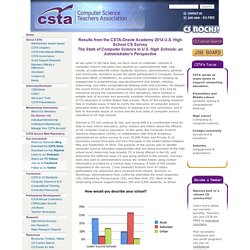
High School CS SurveyThe State of Computer Science in U.S. High Schools: an Administrator's Perspective As we usher in the New Year, we have much to celebrate: interest in computer science education has reached an unprecedented high. Last month, an estimated 80 million students, teachers, administrators, parents, and community members across the globe participated in Computer Science Education Week (CSEdWeek), an annual event committed to ramping up engagement in programming, app development and design, robotics, networking, and other computational thinking skills and activities. Yet despite the recent frenzy of activity surrounding computer science (CS) and its relevance among the constellation of core disciplines, there remains a notable lack of accurate and generally available information about the state of CS education in United States high schools.
The survey data illuminate several key conclusions: School Leaders Mostly Mystified by Computer Science Education. Research School Leaders Mostly Mystified by Computer Science Education By Dian Schaffhauser02/02/15 Low-income schools are less likely than higher income schools to offer computer science (CS) classes.
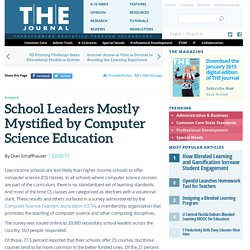
In all schools where computer science courses are part of the curriculum, there is no standardized set of learning standards. And most of the time CS classes are categorized as electives with a vocational slant. The survey was issued online to 20,000 secondary school leaders across the country; 503 people responded. Of those, 77.5 percent reported that their schools offer CS courses, but those courses tend to be more common in the better-funded ones. The term "computer science" boggled some respondents. A Coder, a Programmer, a Hacker, a Developer, and a Computer Scientist walk into a Venn Diagram.
How to use GNU licenses for your own software. This is a brief explanation of how to place a program under the GNU General Public License, Lesser General Public License, or Affero General Public License.
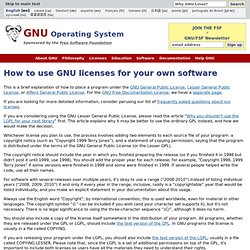
For the GNU Free Documentation License, we have a separate page. If you are looking for more detailed information, consider perusing our list of frequently asked questions about our licenses. How To Pick A Programming Language To Learn Today & Get A Great Job In 2 Years. Coding ain’t easy; or at least, learning to code isn’t, especially when starting from scratch.

It can take years of dedicated work to become a truly good programmer; so is there a way to choose the right language to start from today, in order to get hired in a couple of years? To find out, I took this question to our panel of resident experts: While we all write, several of us also have coding experience. What ensued was an interesting discussion that you would want to read before embarking on your journey to become a pro coder. A Method To the Madness? This is not the first time we discuss picking a programming language: Back in 2011, we’ve discussed which programming language you should learn for software development? But this isn’t about one piece of advice (such as “go with JavaScript”) but a methodology — something people could use in two years from today, theoretically.
There Is No One Language. Coding for Kids. Coding is an emerging global “language” – arguably the most important one at the moment.
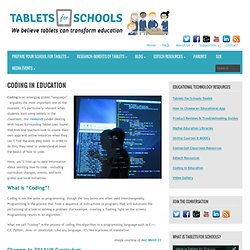
It’s particularly relevant when students start using tablets in the classroom. Our research (under Dealing With Issues Surrounding Tablet Use) found that kids and teachers look to create their own apps and online resources when they can’t find the ones they need. In order to do this, they need to understand at least the basics of how to code. Here, you’ll find up-to-date information about learning how to code – including curriculum changes, events, and both global and local initiatives.
What is “Coding”? Resources for Computer Science Education Week. Grace Murray Hopper at the UNIVAC keyboard, c. 1960.
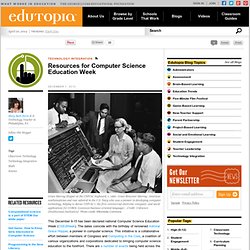
Grace Brewster Murray: American mathematician and rear admiral in the U.S. K-12 Alliance. Computer Science. Gates, Zuckerberg champion computer programming in new nonprofit video. Anybody can learn. Computer Science Gets Plug in House Bill to Revise ESEA - Curriculum Matters. UserID: iCustID: IsLogged: false. Kiki Prottsman: Why American Students Are Trailing in Computer Science. Imagine, if you will, a world where Americans don't teach their children math in elementary school. Imagine that children no longer learn addition in first grade, subtraction in second or multiplication and division in third and fourth. Imagine instead that children make it all the way through high school without having any formal presentation of mathematical concepts. Now imagine that a student is observant enough to realize that adults who have a firm grasp on mathematics have much better problem-solving life skills and financial opportunities than adults who don't.
Cyhscomputercareers / FrontPage. We will use this workspace to explore computer careers and share this knowledge with other students interested in pursuing computer careers. To start, here are some websites with good information about careers in the computer industry. Two organizations that many computer professionals belong to include: The Association for Computing Machinery (ACM) ACM Computing Careers Website. IT Workforce Can't Meet Demand for Cloud Skills CIO. CIO — The cloud computing job market is continuing to mature and as companies define what cloud computing is to them, they will a need a new breed of cross-trained specialists to meet business goals. But finding those cloud-savvy IT pros may prove to a challenge. A Microsoft-commissioned IDC study, which is being released later today reveals a talent shortage unlike any we have seen in the past. The study is based on interviews with more than 600 hiring managers from around the world and investigates the impact that cloud computing will have on IT employment and its influence on the way organizations staff their IT departments.
The IT market is expected to grow roughly 1.1 percent--to 2.7 percent through 2020 and cloud-related skills represent virtually all the growth opportunities in IT employment worldwide. According to the IDC study, the demand for cloud computing will grow at six times the rate of IT skills overall. Lack of training Lack of certification Lack of experience.